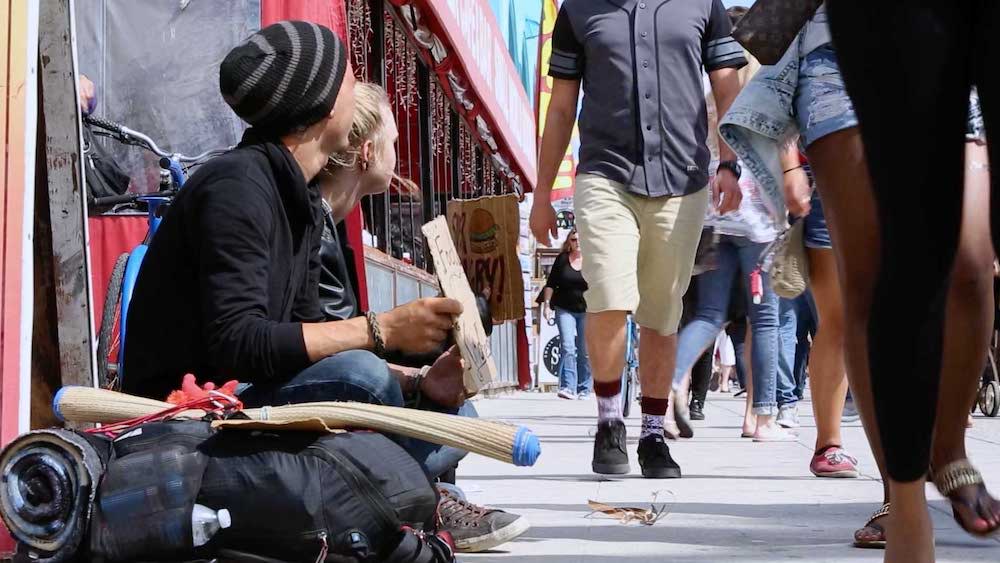‘Lost in America’: Film Review

Click here to read the full article.
You might feel a sense of shame watching Rotimi Rainwater’s “Lost in America,” an expansive documentary look at the issue of youth homelessness in a country where the problem seems unthinkable, and its victims are so often invisible. You are likely to ask yourself how many times you have passed by a homeless child and did not quite see them. The statistics are scary: According to a recent study, nearly 4.2 million kids live out on the streets due to heartbreaking reasons which Rainwater examines in his caring film, chronicling his six-year journey across 15 cities to grasp the breadth of the epidemic. One thing will be certain after tagging along that trip with him: Your eyesight will never skip over the homeless youth again.
That is mostly thanks to Rainwater’s approachable prose — not a feat of filmmaking perhaps, but an absorbing act of compassion nevertheless. As a person who once was homeless himself (an experience that informed his 2013 narrative feature “Sugar”), Rainwater moves through “Lost in America” with hard-earned assurance, having an insider’s view into the suffering millions of kids encounter every day, with scores of them dying on a daily basis. (At the end of the film, the writer-director tells us for context that over the time it takes to watch his movie, one homeless youth passes away.) He also receives generous amounts of help from the power of celebrity, as Tiffany Haddish, Jon Bon Jovi, Halle Berry, Sanaa Lathan, Miley Cyrus, Jewel and Rosario Dawson (the last two also being executive producers) appear throughout the film with insights and suggestions. While their words don’t add up to anything groundbreaking, their towering presence might just be what sells the film to the general public, both in theaters and on streaming platforms.
More from Variety
Tiffany Haddish, Willem Dafoe and Tye Sheridan Join Oscar Isaac in 'The Card Counter'
SXSW Film Festival to Include Movies From Issa Rae, Pete Davidson and Tiffany Haddish
Salma Hayek on Women in Hollywood: 'We're On the Right Path, and We're Not Going to Stop'
Elsewhere, Rainwater demonstrates that he must have watched a few Michael Moore documentaries, walking away from them with effective ideas to send off waves of shock and distress among the audience. He applies them generously to his output — like Moore, Rainwater often narrates and over-explains his scenes, plugs himself into almost all the interviews and dramatizes the story’s transitions by emphasizing them through voiceover. He also stops random people on the street and puts them on the spot with their misinformation. (In one of those instances, he exposes an enormous public misconception around why young people live on the streets: many falsely seem to think it’s by choice or to do drugs.) This overt hand-holding oversimplifies the material to a degree, but keeps us engaged.
Still, some of the writer-director’s less-than-elegant artistic choices matter very little when the homeless kids themselves take over with their own stories, each marked with unspeakable trauma. Rainwater sees patterns in their history and smartly organizes his film around various groups of homeless teens: those failed by the dysfunctional foster care system (Haddish herself identifies as “a foster care survivor”), others preyed on by sex traffickers or rejected by families due to their sexual orientation, and so on. (More than 40% of all homeless kids are LGBTQ youth, figures inform.) We meet the likes of Calub, a transgender boy unwelcome by his parents; Crystal, who shares her harrowing account of being chained and sold for sex; Makayla and Conner, a couple who experience a traumatic miscarriage and cruel treatment by the healthcare staff while out in the streets; and others that somberly recall heartbreaking accounts of rejection, abuse and even rape. While listening to the kids, Rainwater makes sure we see the humanity and future potential in each and every one, treating his subjects with the respect they deserve.
For larger context, we also get a mini lesson on the history of homelessness in America, a phenomenon a lot more recent than most people might think. Armed with factual numbers and talking-head experts, Rainwater ties its upsurge back to the ’80s, when Gordon Gekko-esque greed became the society’s main value stream under the Reagan presidency. He then examines the contemporary government’s elongated inaction, while a few senators such as Vermont’s Patrick Leahy and North Dakota’s Heidi Heitkamp fight the good fight to curb the countrywide crisis. “Lost in America” offers us a chance to be a part of these efforts, too. No contribution is too small, Rainwater and his subjects remind us. Not even a minor act of kindness like giving a warm, welcoming smile to a kid who could use the dignifying acknowledgement.
Best of Variety
Sign up for Variety’s Newsletter. For the latest news, follow us on Facebook, Twitter, and Instagram.

 Yahoo News
Yahoo News 
